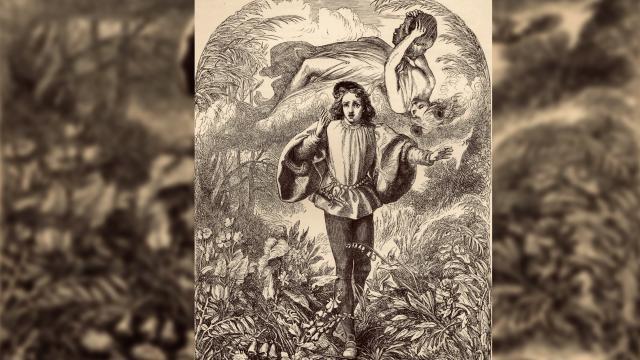
Materiality and Re-Enchantment in Shakespearean Romance, 1608-1613
Exit Seminar presented by SLLL PhD candidate Barbara Taylor.
In the final years of his professional life, William Shakespeare’s drama entered the period we now refer to as his “late romances,” plays in which the supernatural world hovers at the edges of all action, and the lines between tragedy and comedy blur. These plays, written and first performed between 1608-1613, pushed the limits of what was considered stageable and believable in the early modern playhouse. In doing so, this collection of plays responded to a post-Reformation crisis of the spiritual imagination—what to believe, and how to conceive of it—through creative experiments in “enchantment”. This thesis argues that these plays amount to a seventeenth-century project of “re-enchantment,” and seeks to amend teleological accounts of “the disenchantment of the world” by suggesting that creative resistance to disenchantment was already in progress in the early seventeenth century. Far from being immaterial fantasy, the plays under consideration in this thesis—Pericles, Cymbeline, The Winter’s Tale, The Tempest, Henry VIII (All Is True), and The Two Noble Kinsmen—each materialise post-Reformation spiritual dilemmas in performance, bringing to the forefront drama’s potential to make visible the otherwise invisible facets of spiritual crisis: contested spaces like Purgatory, the vitality of objects such as relics, and the embodied experience of prophecy.
By combining theoretical approaches from areas of ecocriticism, materialism, and affect theory, I explore how the material spaces, objects, and bodies in these texts engage with early modern spiritual dilemmas. Across three case studies, I undertake close readings of theatrical texts in pairs, paying attention to their original performance conditions, and placing them in conversation with each other as well as contemporaneous theological, political, and imaginative writing of the period. In the first case study, I position the oceanic spaces of Pericles and The Tempest as experimental navigations of an alternative Purgatory. In the second, I trace the stage lives of theatrical props in Cymbeline and All Is True as desacralized relics. In the third and final case study, I consider the implications of embodying and producing prophecy in The Winter’s Tale and The Two Noble Kinsmen. Together, I use these case studies to test my theory of “the dramaturgy of enchantment,” to suggest that re-enchantment is part of these plays’ structure, production, and reception. Ultimately this thesis argues that these plays deliberately cultivate wonder, an affect closely tied to awe and terror, to capitalise on the affective dimensions of live performance in a period of political, social, and religious ambiguity. Enchantment is thus positioned as an ambivalent cultural mood; one that can accelerate the decay of damaged sites of spiritual fulfilment, or work to repair them.
Speaker:
Barbara Taylor is a PhD candidate at the Australian National University in Canberra. Her research focuses on early modern drama and culture, and her doctoral thesis examines the ways in which dramatic romance cultivates “wonder” beyond the sacred and supernatural. Barbara previously earned a B.A. (Hons) in Ancient History and English Literature from the University of Sydney, and an M.A. in Shakespeare Studies from King’s College London. She has worked as a dramaturgical researcher for Shakespeare’s Globe London, the National Institute of Dramatic Art in Sydney, and for independent Australian theatre.
Also presented via Zoom
Join Zoom Meeting
https://anu.zoom.us/j/87238729520?pwd=sF4jy4SW8jtVUtCGGNa66WkyyJB1s4.1
Meeting ID: 872 3872 9520
Password: 854260
Location
Speakers
- Barbara Taylor